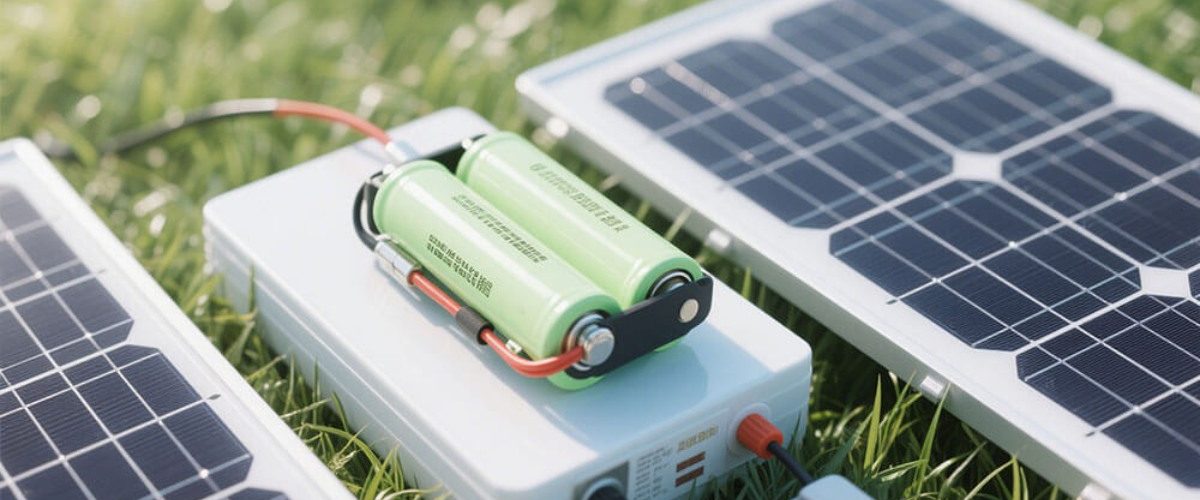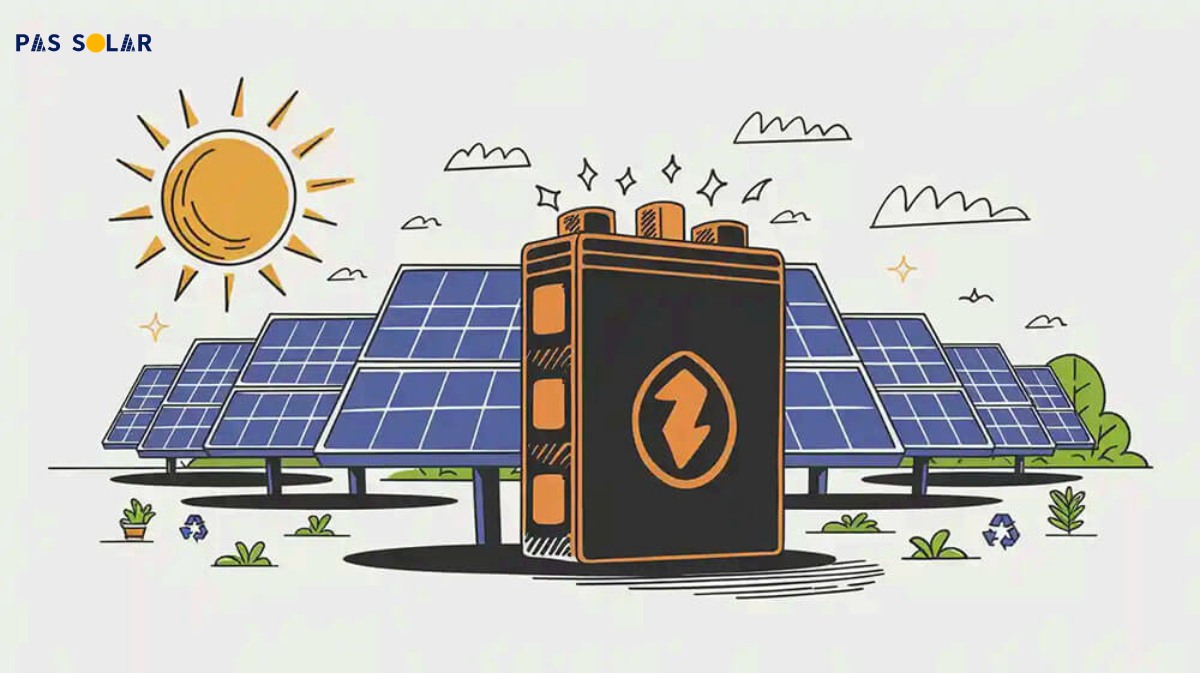
Solar Lithium Battery Efficiency is one of the key factors that determines whether your investment works well or reduces its overall capability. In modern solar energy systems, a LITHIUM SOLAR BATTERY is the heart of every high efficiency solar system and it is not just a storage unit. It directly influences the usable energy capacity and the abilities of the system to maintain stable output during the time. For large scale energy managers such as factory owners and contractors,around Iraq, the UAE, and Dubai, greater efficiency translates to less money spent on operations and more usable power from each installed kilowatt. In the cities with hot and humid climates, improving solar battery efficiency helps the system stay reliable during the day’s peak demand and seasonal changes.
When managed properly, a Solar Lithium Battery can achieve up to 98% efficiency, significantly perform better than traditional lead-acid batteries and ensure maximum usable energy for industrial and commercial projects. But the challenge isn’t just buying a high-efficiency solar battery; it is knowing how to operate and maintain it in a way that maximizes the performance it was engineered for.
For business owners and industrial project managers, the efficiency of batteries reduced need for replacements, uninterrupted energy delivery, and reliable long term planning. If not managed correctly, a system wastes stored energy by heat, electrical resistance, and in correct charging behaviors. This not only reduces battery life but also increases project costs.
By understanding the factors that influence Solar Lithium Battery Efficiency, you can improve performance up to 20–30% without adding expensive components and costly improvements. Efficiency is what turns raw energy into real world savings. It’s what separates a project that simply “works” from one that provides quantifiable returns.
Pas Solar gives you real insights for improving solar battery efficiency in all types of climates. We will talk about temperature management, smart charging to advanced control systems and distributor selection.

Even the most advanced Solar Lithium Battery can lose efficiency if its design and setup aren’t optimized. Every technical detail from voltage configuration to ambient temperature directly impacts how efficiently your system converts and stores energy. To achieve high-efficiency solar battery performance, let’s break down the core engineering factors that matter most.
Temperature is the number one enemy of Solar Lithium Battery Efficiency.
When cells operate above 40°C, internal resistance increases, and the battery starts wasting energy as heat. In contrast, extremely cold conditions slow chemical reactions and reduce discharge capability.
For regions like Dubai and the UAE, where ambient heat can exceed 50°C, proper ventilation, shading, and temperature-controlled enclosures are essential. Installing batteries indoors or using insulated containers prevents overheating and ensures consistent energy output even during peak daylight hours.
Pro tip from Pas Solar: Pair your LITHIUM SOLAR BATTERY with a smart ventilation or cooling system to stabilize performance year-round.
The way your batteries are connected series vs. parallel affects both power flow and overall solar battery efficiency.
A poorly balanced connection can cause uneven current distribution, forcing some cells to work harder and heat up faster.
A well-designed system should:
These small engineering decisions can dramatically improve overall system performance and prevent inefficiencies that accumulate over time.
A Battery Management System (BMS) is the brain of your Solar Lithium Battery. It monitors voltage, temperature, and current across each cell, balancing charge levels to maintain stable operation.
Without a calibrated and regularly updated BMS, even a high-end battery can lose up to 15% of its usable efficiency.
Regular firmware updates, real-time monitoring, and automated cutoff protections not only enhance efficiency but also extend lifespan a crucial advantage for industrial users who rely on uninterrupted power.
Dust, moisture, and direct sunlight are silent degraders of solar battery efficiency. Installing batteries in controlled indoor environments, with moderate humidity and airflow, keeps them performing close to their rated efficiency.
When storage facilities are well-maintained, lithium cells experience less corrosion and voltage fluctuation leading to steadier, more predictable performance.

Having the right setup is only half the equation how you operate and maintain your Solar Lithium Battery determines how efficiently it performs over time. Even the best system can lose up to 25% of its potential output if handled incorrectly. Here’s how to keep your solar battery efficiency consistently high.
One of the simplest yet most effective ways to enhance Solar Lithium Battery Efficiency is to avoid overcharging and deep discharging.
Keeping the state of charge between 20% and 80% helps reduce stress on the cells and minimizes degradation.
For business owners running solar farms or industrial power systems, automated charge controllers can stabilize voltage and prevent costly energy waste. Avoid leaving batteries fully charged for long idle periods this reduces internal wear and heat buildup, especially under high ambient temperatures common in the UAE and Dubai.
Pas Solar Tip: Set voltage thresholds according to manufacturer specs and use temperature-compensated charging profiles for maximum stability.
Consistent discharge patterns improve the chemical balance inside the cells. Sudden spikes or uneven loads cause fluctuations that lower the overall high-efficiency solar battery rating.
Design your energy system so that discharge current stays below 0.5C for regular use. For backup or peak hours, short higher discharges are acceptable but not routine.
Balanced usage extends not only the lifespan but also helps the system deliver more usable watt-hours per cycle, improving solar lithium battery efficiency without extra hardware.
Real-time data monitoring is essential for maintaining improving solar battery performance.
Check your system dashboard regularly for temperature, voltage drift, and depth of discharge trends. Schedule preventive inspections at least once per quarter this helps detect small issues like terminal looseness, corrosion, or cell imbalance before they turn into expensive repairs.
Store this data in a digital log, and analyze trends seasonally to identify any gradual efficiency decline. Over time, this habit can save thousands in replacements and downtime.
Software updates are often overlooked but critical for Solar Lithium Battery systems.
Updated firmware improves accuracy in cell monitoring, communication between inverters, and balancing algorithms. Always coordinate firmware updates with your Solar Lithium Battery distributor or a certified technician to avoid compatibility issues.
If your batteries need to be stored before installation, keep them around 40% charge in a cool, dry place. For exporters or contractors in hot regions like the UAE, ensure that transportation follows international lithium battery safety standards — avoiding temperature shocks or prolonged exposure to sun.
Proper logistics are part of efficient energy management and directly support Solar Lithium Battery Efficiency over the long run
Reaching maximum Solar Lithium Battery Efficiency isn’t about one single change it’s about consistency, monitoring, and using the right technology partner. Whether you’re powering an industrial complex in Dubai, a construction site in Iraq, or an off-grid facility in Iraq, following a disciplined efficiency plan ensures every watt from your solar panels is stored and delivered effectively.
Below is a practical checklist to help keep your system performing at its best.
| Action | Frequency | Purpose / Effect on Efficiency |
| Check charge/discharge balance | Weekly | Keeps cells balanced and prevents capacity loss |
| Inspect terminals and cabling | Monthly | Reduces resistance and improves power transfer |
| Test BMS and update firmware | Quarterly | Optimizes control logic and avoids system errors |
| Monitor temperature and humidity | Continuous | Prevents heat-related degradation |
| Review performance logs and trends | Monthly | Identifies early efficiency loss or imbalance |
| Equalize voltage among cells | Every 6 months | Maintains uniform charge and improves reliability |
| Store batteries at 40% charge if unused | Before long-term storage | Prevents over-discharge and permanent cell damage |
| Verify distributor authenticity | Once per purchase | Ensures original LITHIUM SOLAR BATTERY with full warranty |
| Clean ventilation systems | Quarterly | Keeps airflow optimal for stable operation |

Ultimately, improving solar battery performance requires a balance between technology, expertise, and trusted supply. That’s where Pas Solar stands out. As an authorized Solar Lithium Battery distributor with operations across Dubai, the UAE, and the Middle East, Pas Solar provides:
Choosing the right partner ensures not only higher solar battery efficiency but also long-term reliability, lower maintenance costs, and steady project performance the factors that define success in modern energy businesses.
In today’s fast-changing renewable market, every percentage of efficiency matters. Your Solar Lithium Battery is more than storage it’s the foundation of stable power, predictable savings, and sustainable growth. By following the practical steps in this guide, using trusted hardware, and partnering with Pas Solar, you can make sure every unit of energy you produce is stored with precision and used efficiently.
For expert advice, original products, and performance-driven solutions, contact Pas Solar your reliable Solar Lithium Battery distributor in Dubai and the UAE.
PAS SOLAR is a Distributer of solar equipment based in UAE. Composed of a team of professionals with the goal to provide customers with the latest Tier 1 Solar system in the region.
"*" indicates required fields